Timeline & Fun Facts

The smarter way to stay on top of broadcasting and cable industry. Sign up below
You are now subscribed
Your newsletter sign-up was successful
Click here for more on B&C's 80th anniversary
1931
- The first issue of Broadcastingmagazine appears on Oct. 15.
- Radio is king, and Bing Crosby and the Mills Brothers are the hot new crooners.
1932
- CBS, NBC and New York area stations go into round-the-clock operations to cover the Lindbergh baby kidnapping, radio's biggest spot-news reporting job to date.
- General Electric and Westinghouse agree to divest themselves of their stock control of RCA, which becomes a completely independent company.
- Allen DuMont invents radar for the U.S. Army.
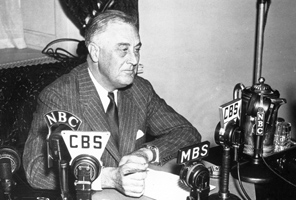
1933
- President Roosevelt uses combined CBS-NBC network power for his Fireside Chats.
1934
- The Communications Act of 1934 births the Federal Communications Commission, which regulates broadcasting, creating new rules on commercial and non-commercial uses. It replaces the Federal Radio Commission.
- Start of the Mutual Broadcasting System, a fourth radio network.
1935
- RCA takes television out of the laboratory for a $1-million field-test program.
1936
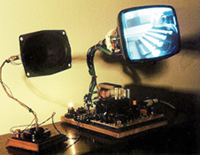
- Don Lee Broadcasting System starts the first public demonstrations of cathode-ray television in the U.S.
- Political parties spend an estimated $2 million for preelection radio ad time. The Republican Party tries something new: negative radio campaign ads.
- Engineer Arthur C. Nielsen pioneers an audience measurement system to determine radio ratings.
- There are 33 million radios in the U.S.
1937
- Herbert Morrison delivers a live account of the Hindenburg explosion.
- In May, RCA demonstrates projection television with images enlarged to 8 by 10 feet.
1938
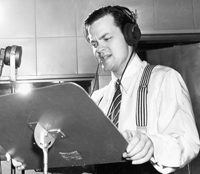
- Live TV in color is first demonstrated.
- Martians attack the Earth...at least according to Orson Welles' radio drama, War of the Worlds.
1939
- After 15 years of litigation, Dr. Vladimir Zworykin is granted a patent for iconoscope-kinescope tubes, the basis of electronic television.
- The radio networks draft a "code for war coverage"; the goal is full, factual reporting with a minimum of horror, suspense and undue excitement.
- Television makes its debut at the New York World's Fair.
1940
- CBS demonstrates a system of color television developed by Peter Goldmark, its chief TV engineer.
1941
- The first television commercial is broadcast in New York. A rate card puts NBC's WNBT base rate at $120 per evening hour.
- General Foods signs an unprecedented contract with Jack Benny, giving the comedian control of his Sunday-night time period on NBC Red Network.
- FDR's declaration of war, broadcast to the nation on Dec. 9, has the largest audience in radio history, about 90 million.
- Commercial TV begins, but war intervenes.
1942
- Due to war, CBS cuts time allowed for commercials on newscasts by 20 percent and bans jingles or other "undue gaiety."
- The U.S. Office of Censorship bans any mention of weather during baseball broadcasts (to avoid giving enemy agents valuable intelligence about conditions in U.S. cities).
1943
- General Dwight D. Eisenhower himself broadcasts news of Italy's surrender, the first such event to be announced over the radio.
1944
- Military authorities and radio networks join forces to provide the American public full coverage of the invasion of Europe.
- The Blue Network changes its name to the American Broadcasting Co.
1945
- Edward R. Murrow's report from Buchenwald is the height of uncompromising radio during the war.
- The FCC creates VHF channels numbering 2 through 13.
- Radio tells the world of Japan's acceptance of Potsdam terms and the end of World War II.
- Broadcasting becomes Broadcasting.Telecasting.
1946
- Army Signal Corps Officer John H. DeWitt "shoots the moon" by bouncing a radar signal off the moon some 240,000 miles away and getting an echo back.
- RCA and CBS demonstrate color TV film programs.
1947
- The first telecast from the White House is made when President Truman addresses the nation.
- The House Un-American Activities Committee begins its investigations of the entertainment industry.
- Meet the Press begins a run that's still going strong.
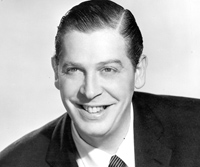
1948
- Texaco launches NBC-TV series starring Milton Berle.
- CBS raids NBC's talent pool, signing Amos ‘n Andy' and The Jack Benny Show.
1949
- Thanks to Jack Benny and Amos 'n' Andy, CBS Radio now tops NBC in ratings in the critical 7-8 p.m. period.
- The first Emmy awards are presented.
- Network TV is established.
1950
- The vidicon camera tube improves TV picture quality.
- NBC counter-raids CBS for talent and signs Groucho Marx and Bob Hope.
- In the face of growing investigations into communists in the media, CBS asks employees to sign loyalty oaths.
1951
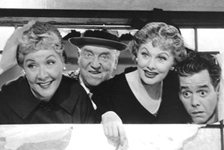
- "Top 40" radio format is created.
- Gillette signs four-year contract with NBC to broadcast World Series games.
- I Love Lucypremieres on Oct. 15, launching the modern sitcom and pioneering the three-camera shooting technique.
- David Sarnoff, RCA board chairman, on completion of 45 years in radio, asks RCA scientists for three "gifts" for his 50th anniversary: an electronic amplifier for light for television, a television picture recorder and an electronic air-conditioner for home use. He'll get them.
1952
- NBC premieres Today on Jan. 14, giving rise to the morning show.
- CBS demonstrates all-electronic color-TV receiver
- The "Checkers Speech" saves Richard Nixon's political career...for now.
- President Truman signs the McFarland Bill, the first major overhaul of the Communications Act of 1934.
- CBS coins a new word: "anchorman."
1953
- Bing Crosby Enterprises demonstrates its much-improved magnetic-tape TV recordings.
- This is only a test: Conelrad's emergency radio system, that is.
- CBS-TV and NBC-TV inaugurate "hot kinescope" systems to put programs on air on West Coast at same clock hour as in East.
- FCC approves the start of color TV (though it takes a decade to catch on).
1954
- RCA announces the first all-electronic color tube, marketing it to TV set manufacturers.
- Fifty-four percent of Americans have TVs.
- Radio ad time sales of $453 million show a 5% decline from previous year, the first dip since 1938; TV revenue, for first time, is higher than radio's. Combined, TV and radio revenue pass the billion-dollar mark.
- Edward R. Murrow calls out Senator Joseph McCarthy and helps bring down McCarthyism.
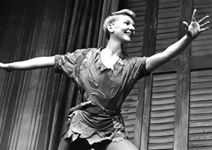
1955
- About 65 million people watch a broadcast of the play Peter Pan on NBC. Theater producers acknowledge it would have taken the show 65 years to reach that many people on Broadway.
- Transistorized radio and an earth satellite relay station for transoceanic TV are introduced at the Institute of Radio Engineers convention.
1956
- Robert Adler creates the "Zenith Space Command," the first practical wireless remote control. The unit has four buttons: channel up, channel down, sound on/off and power on/off. Sadly, man must wait 10 more years for the Barcalounger.
- At the NARTB Chicago convention, the Ampex TV tape recorder steals the show -- and $4 million in orders.
1957
- Tobacco advertisers say an American Cancer Society report linking smoking with death will have little effect on cigarette advertising.
- The FCC studies subliminal perception as stations experiment.
- Advertiser Kolynos quits Grey Advertising after the agency's president tells a TV interviewer he used another brand of toothpaste.
1958
- TV Q-ratings are offered as a measure of program appeal.
- CBS-TV broadcasts The Plot to Kill Stalin -- and the USSR closes CBS News' Moscow bureau.
- Baseball's major leagues reject players' pitch for share in TV profits.
1959
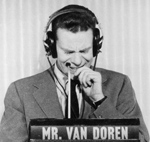
- Payola rocks radio. Charles Van Doren becomes the face of TV quiz-show rigging.
- Ampex introduces a mobile videotape recorder -- and uses it to tape the Nixon-Khrushchev "kitchen debate," which is then smuggled out of Russia for broadcast in U.S.
- President Eisenhower calls quiz show rigging "a terrible thing to do to the American public."
- According to station reps, government probes and payola scandals have not hurt television quiz show or radio ad time sales.
1960
- Seven of eight U.S. homes have a TV set, and more than 500 TV stations are broadcasting.
- Canadian pay-TV families spend 80 cents per week to see movies at home.
- With Nixon-Kennedy debate, television becomes a winning factor in a presidential election.
1961
- Edward R. Murrow leaves CBS to head up the U.S. Information Agency.
- FCC Chairman Newton Minow calls television a "vast wasteland" and warns broadcasters to improve programs or get off the air.
- Writers tell the FCC that television's promise of a "golden age" has hit a dead end.
- ABC-TV engineers develop a process for slow-motion video playback.
1962
- John Glenn's space flight is seen by 135 million TV viewers.
- Possible harm from smoking could endanger TV's tobacco billings of $114.6 million a year.
- Telstar, AT&T's orbiting satellite, makes glamorous, global TV debut.
- Late-night television income has tripled in five years.
- Network news chiefs charge Pentagon with managing news in Cuban crisis.
1963
- Astronaut Gordon Cooper sends back first TV pictures from space.
- Cigarette companies halt on-campus advertising.
- Blacks campaign for more
- jobs in broadcasting; Sen. Strom Thurmond accuses networks of "slanting news" and "following the NAACP line."
- Sony's open-reel videotape recorder goes for $995.
- Coverage of the Kennedy assassination, and the funeral, shocks and then unites the nation, and remakes television news.
1964
The smarter way to stay on top of broadcasting and cable industry. Sign up below
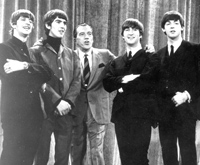
- Japan's NHK begins developing HDTV.
- The Beatles appear on Ed Sullivan, and the glorious screams are deafening.
- The U.S. government, tobacco companies and broadcasters ponder their next moves after a report to U.S. surgeon general links cigarette smoking to lung cancer.
- Republicans protest Johnson campaign TV commercial linking little girl and nuclear cloud as unfair scare tactics.
1965
- Cigarette bill passed by Congress calls for health warning on package, but not on advertising.
- Los Angeles broadcasters use helicopters to cover Watts riots after mobile units are destroyed and newsmen beaten.
- Pope's historic visit to U.S. is seen in 90 percent of nation's homes and inspires Dr. Carl McIntire, radio evangelist, to seek free time to reply to what he calls "religious propaganda."
1966
- FCC blocks cable TV wiring in large cities.
- Fred W. Friendly quits as president of CBS News when new boss John Schneider cancels coverage of Senate hearing on Vietnam.
- Network coverage of 'Gemini 8' splashdown brings thousands of calls from angry viewers who missed regular programs.
- TV networks do fast, comprehensive election reporting job, marred by some wrong predictions, according to reports.
1967
- Prerecorded movies on video are sold for home use.
- AFTRA strikes networks; NBC's Chet Huntley stays, on grounds that union dominated by entertainers cannot properly represent newsmen, a move that angers coanchor David Brinkley.
- Phil Donahue first takes his mike into the audience during his talk show.
1968
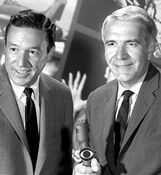
- 60 Minutespremieres on CBS.
- Sony develops the color Trinitron TV tube.
- NBC and CBS give GOP convention gavel-to-gavel coverage; ABC has late-evening summary, gains ratings advantage with early-evening entertainment.
- Battles at -- and outside of -- the Democratic convention in Chicago offer vivid contrast to Republicans' Miami meeting.
- The "Heidi Bowl," when NBC switches from a football game to start the movie Heidi on time, rouses tremendous ire among football fans.
- Laugh-In premieres? You bet your sweet bippy.
- Walter Cronkite reports his belief that the war in Vietnam will end in a "stalemate," influencing President Johnson's decision not to run for reelection.
1969
- Armstrong and Aldrin walk on the moon and the world watches it on TV.
- Supreme Court ‘Red Lion' ruling limits broadcasting's First Amendment rights as President Nixon goes to war against broadcasting.
- CBS fires the Smothers Brothers after Tom and Dick insist on being politically incorrect -- and, rumor has it, after Nixon leans on CBS chief William Paley.
- The bird is the word: Sesame Street premieres and reshapes kids TV.
1970
- Pay TV gets green light.
- Monday Night Football debuts on Sept. 21, changing the sports-TV playing field.
- House, Senate agree on legislation to outlaw cigarette advertising on radio and TV, but change the date from Jan. 1, 1971, to Jan. 2, to allow commercials to appear on New Year's Day football bowl games.
1971
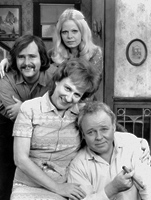
- FCC endorses agreement of TV networks to designate 8-11 p.m. as primetime in fall.
- All in the Family debuts, generating ratings and controversy for the way it handles bigotry.
1972
- Satellite coverage of President Nixon's trip to Red China marks new milestone in broadcast history.
- Citytv, with its unconventional, influential approach to news delivery, premieres in Canada.
1973
- The Watergate hearings begin.
- FCC grant for channel 32 WGPR-TV Detroit provides construction permit for what is to be national's first black-owned TV station.
- Resignation of Vice President Spiro Agnew, an outspoken critic of media, defuses First Amendment controversy he stirred.
- The Louds implode on PBS' An American Family.
1974
- President Nixon's appearance at the NAB convention in Houston is marked by controversy over his exchange with CBS' Dan Rather.
- NBC-TV agrees to pay record $10 million for single two-part showing of The Godfather.
- Up to 110 million witness President Nixon's resignation on TV.
1975
- Home Box Office becomes the first TV network to continuously deliver signals via satellite when it broadcasts the "Thrilla in Manilla" boxing match between Muhammad Ali and Joe Frazier, effectively ensuring the long-term viability of pay TV.
- The Hollywood creative community files suit against the FCC, the Big Three networks and the NAB for imposing family viewing on TV.
- Bill Gates and Paul Allen form Microsoft.
- Sony unveils its ill-fated Betamax videocassette recorder.

1976
- Steve Jobs and Steve Wozniak form Apple Computer.
- Court rules that the "family hour" is unconstitutional.
- Twenty-eight-minute audio failure mars first presidential debate between Jimmy Carter and Gerald Ford.
- Ted Turner delivers TV nationwide via satellite.
- JVC introduces VHS.
- Barbara Walters becomes the first woman anchor of an evening newscast.
1977
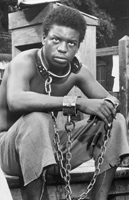
- ABC's eight-day telecast of Rootsbecomes the most-watched program in history; 80 million people see at least part of the final episode.
- ABC wins its first primetime ratings ever, ending CBS' 20-year reign.
- Florida youth Ronnie Zamora's plea of "TV intoxication" as defense in murder of elderly woman is rejected by jury in trial televised in Miami.
- Nintendo starts selling computer games.
1978
- Fred Silverman, president of ABC Entertainment, is named president/chief executive of NBC.
1979
- Ampex demonstrates a digital videotape recorder.
- Government announces closed-captioning of TV programs for hearing impaired.
- Ted Turner announces the start of CNN.
- ESPN debuts.
- A federal judge in Los Angeles rules home taping of television programs is legal.
1980
- Dan Rather is named as anchor successor to Walter Cronkite upon latter's retirement in 1981.
- The "Who Shot J.R.?" episode of Dallas makes history with a 53.3 rating and 76 share.
1981
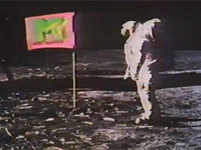
- IBM introduces the PC and Epson releases the first laptop computer.
- Entertainment Tonight debuts and propels satellite distribution of syndicated shows.
- Shooting of President Reagan becomes history's most heavily covered assassination attempt.
- MTV debuts.
- Republicans launch multimillion-dollar ad campaign to gain control of Congress in 1982.
- Luke marries Laura on General Hospital.
1982
- Late Night With David Letterman bows on NBC.
1983
- The M*A*S*H farewell episode on CBS is watched by a then-record 107 million viewers.
- First Lady Nancy Reagan appears on NBC's Diff'rent Strokes to promote her antidrug message.
- ABC's controversial nuke drama The Day After -- with few advertisers -- becomes the most-watched TV movie in history.
1984
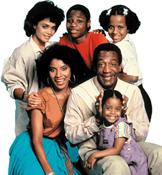
- The Cosby Showpremieres on NBC.
- AT&T fiber-optic cable service runs from Boston to Washington.
- Filming an ad for Pepsi, Michael Jackson burns his scalps and ushers in the big-budget celebrity ad.
1985
- VHS defeats Betamax as the VCR of choice; U.S. VCR ownership rises to 20 percent.
- Pay-Per-View opens for business.
1986
- Rupert Murdoch's Fox Television Network debuts.
- Space Shuttle 'Challenger' explodes as millions watch in horror.
- Geraldo Rivera opens Al Capone's vault, finds lots of dirt and hits paydirt with the most-watched syndicated program ever.
- The Oprah Winfrey Show goes national via syndication.
- The Cosby Show breaks 30-second commercial cost records.
- For the first time, ABC, CBS and NBC have trouble selling commercial time for sports programs.
1987

- The Simpons starts making d'oh for Fox TV.
- Dan Rather, angry that a tennis match causes delay in the start of The CBS Evening News, walks off the set, leaving dead air over the network for nearly seven minutes.
- First condom commercial airs on a major station.
- Spanish-language network NetSpan becomes Telemundo.
1988
- Sobbing TV preacher Jimmy Swaggart admits "I have sinned" after reports of his involvement with prostitutes.
- Ninety-eight percent of U.S. homes have at least one TV.
1989
- Television offers powerful messages in coverage of the falling of the Berlin Wall, the end of the Cold War era and the Tiananmen Square massacre.
- The broadcast networks reach an all-time low of 55 percent of total TV audience in July.
- Time Inc. and Warner Communications merge in a $14 billion deal.
1990
- In a significant first, the antidrug special Cartoon All-Stars to the Rescue, featuring ALF, Bugs Bunny, the Chipmunks, Daffy Duck and other classic characters airs the same Saturday morning on seven networks.
- Seinfeld debuts on NBC.
- The Children's Television Act limits the number of commercials on TV.
1991
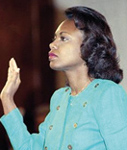
- Home-video footage of Rodney King's beating by Los Angeles cops leads to police-brutality investigations and indictments.
- The coup to depose Soviet leader Mikhail Gorbachev and the rise of Boris Yeltsin dominate international TV reports; the Anita Hill-Clarence Thomas Supreme Court hearings dominate domestically.
- The VCR becomes the fastest-selling electronic item in history.
- The Jerry Springer Show debuts and pulls no punches.
1992
- Johnny Carson departs The Tonight Show in May.
- Cable TV revenue reaches $22 billion.
- Infomercials are info-mazing, accruing $750 million in revenue.
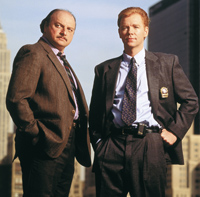
1993
- NBC makes humiliating apology to GM for a staged on-camera explosion during report on alleged safety problems with GM trucks.
- NYPD Blue makes a torrid debut.
- David Letterman bolts NBC for CBS, and the late-night wars begin.
1994
- DirecTV launches its direct broadcast satellite service in the U.S.
- Nancy Kerrigan and Tonya Harding prove to be ratings gold for CBS during the Winter Olympics.
- Two letters: O.J.
- Viacom buys Paramount and merges with Blockbuster.
- More than 43 million fans tune into Ken Burns' Baseball on PBS.
1995
- UPN goes on the air.
- The V-chip is invented.
1996
- The Telecommunications Act of 1996-the first major policy overhaul in 62 years-deregulates the cable industry and jump-starts the battle among phone, cable and broadcast companies.
- Disney acquires ABC.
- Time Warner and Turner merge.
- Working together, the cast of Friends secure a friendly contract renegotiation.
- The four major networks begin using the voluntary system of TV ratings.
1997
- Optical-fiber cable lines now run around the world.
- DVD players, movie sales take off.
1998
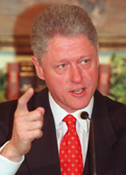
- In January, President Clinton emphatically denies having had "sexual relations with that woman, Miss [Monica] Lewinsky." Seven months later, he kinda changes his mind.
- HDTV broadcast begins in the U.S.
- The Internet has 150 million users by the end of the year, half of them in the U.S.
1999
- Sega Dreamcast 128-bit operating system helps expand videogame market.
- TiVo comes out.
- The Sopranos debuts with a bada-bing.
- The U.S. version of Who Wants to Be a Millionaire makes millions for ABC and reviews a tired genre. Final answer.
2000
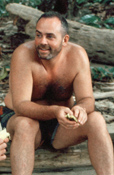
- Courts limit Napster's music file sharing.
- It's the year of the DVD, and Sony Playstation 2 uses DVD for home videogames.
- AOL and Time Warner merge to become the largest media company.
- Survivorpremieres; rats, snakes and a naked millionaire abound.
2001
- More than half of all Americans now use the Internet.
- U.S. ad spending sees its worst single-year downturn since World War II, due in part to 9/11.
2002
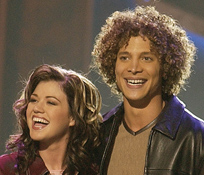
- PS2, Xbox and GameCube attract online gamers.
- Kelly Clarkson and Justin Guarini tune up the first season of American Idol. Judge Simon says, "You're appalling," and bad singers weep.
2003
- DVD sales surpass VHS sales.
- First DVD camcorder goes on the market.
- Cell phones add computer and Internet capabilities.
- Cable TV offers TiVo-like features such as storing and skipping commercials.
2004
- DVD becomes the most common format for home entertainment use.
- RCA sells 61-inch-wide TV sets that are 6.5 inches thick.
- Twenty percent of people under 30 say Internet is their main information source.
- TV provides major coverage of the tsunami that hits Pacific the day after Christmas.
2005
- Hurricane Katrina coverage dominates newscasts.
- Flat-screen TVs, HDTV and plasma screens are growing into industry standards.
- Phone companies make bigger inroads wiring into the cable industry.
2006
- Howard Stern gets Sirius.
- ABC offers Lost and Desperate Housewives for Web and iPod viewing.
- Katie Couric signs up to anchor the CBS Evening News.
2007
- Don Imus inserts boot in mouth and gets his MSNBC walking papers.
- Bob Barker offers up his final Price Is Right showcase.
- The WGA strike delays, rewrites TV production rules.
Steve Jobs unveils the first iPhone.
2008
- Read all about it: Tribune files for Chapter 11.
- From Chicago's Grant Park, President-elect Barack Obama addresses and assures the nation.
- WBQC-CA/Cincinnati asks FCC to change its call letters to WKRP.
2009
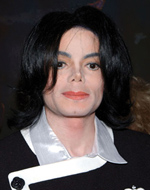
- With the February digital transition not quite ready, the mandatory date is flipped from Feb. 17 to June 12.
- Icons Michael Jackson and Farrah Fawcett die on the same day; weeks later, Walter Cronkite passes.
- Kanye West doesn't let Taylor Swift finish on the MTV Video Music Awards.
- Comcast–NBCUniversal deal is announced (it will take until 2011 for approval).
2010
- Industry rings in the New Year with retrans difficulties, blackouts and carriage disputes.
- Nine months after leaving the Tonight show, Jay Leno returns and replaces Conan O'Brien, creating much late-night joke fodder.
- LeBron James makes...a 'Decision'.
- FCC takes "neutral" stand on Internet, passes controversial "consensus" regs.
- Comcast and Time Warner announce TV Everywhere agreement.
2011
- Oprahends its historic syndication run.
- Charlie Sheen, while high on a drug called "Charlie Sheen," talks himself out of a job.
- The Packers–Steelers Super Bowl XLV, with 111 million viewers, becomes most-watched program in TV history.
- ABC announces it will cancel two soaps, leaving General Hospital the only daytime drama left.
- Broadcasting & Cable celebrates 80 years of covering the industry.
Rob has written for Broadcasting+Cable since 2006, starting with his work on the magazine’s award-winning 75th-anniversary issue. He was born a few blocks away from Yankee Stadium … so of course he’s published three books on NASCAR, most notably, Full Throttle: The Life and Fast Times of NASCAR Legend Curtis Turner. He’s currently the special projects editor at TV Guide Magazine. His writing has appeared in The Washington Post and his origami art has been in The Wall Street Journal. He lives with his family in New Jersey and is writing a novel about the Wild West.

